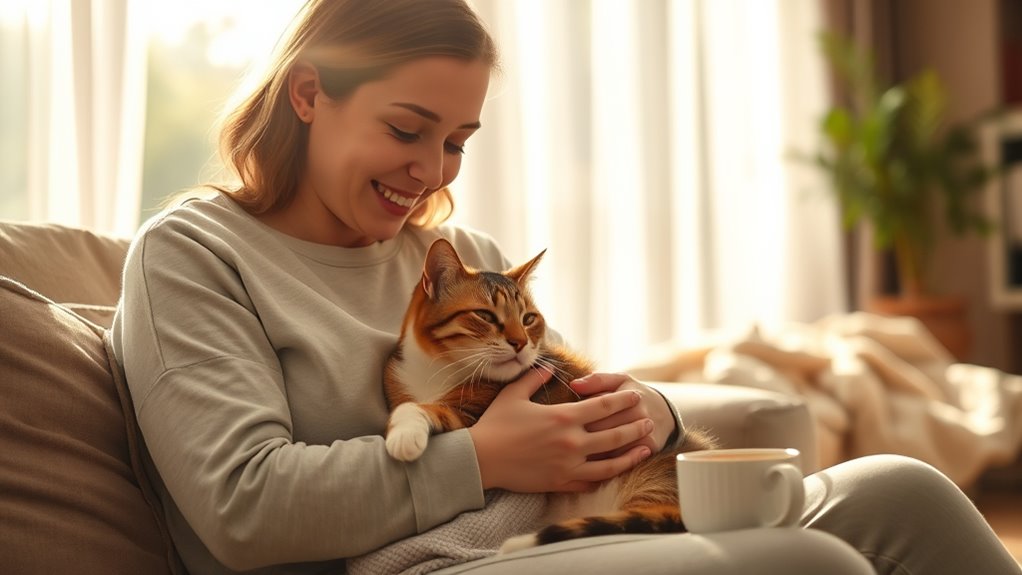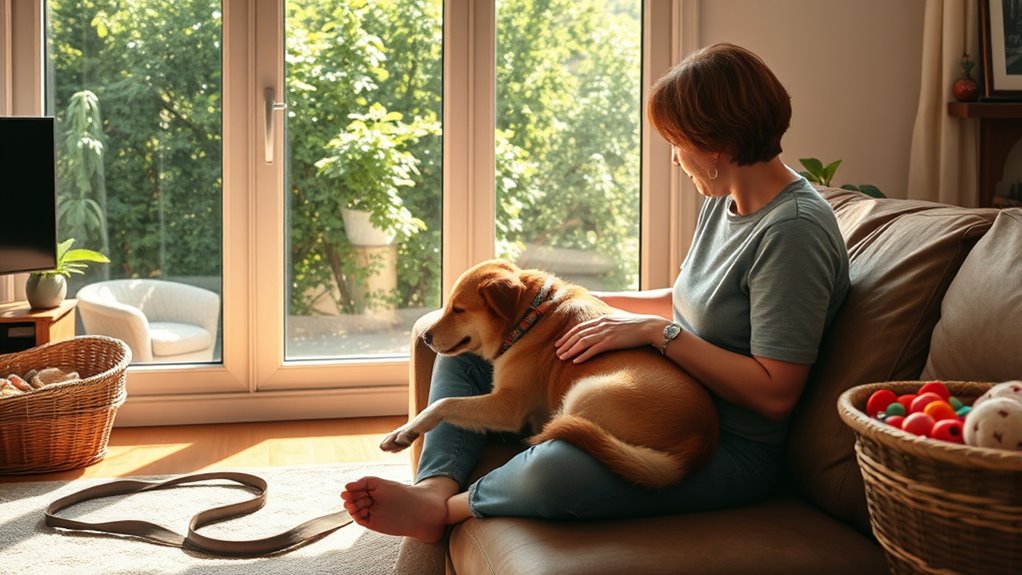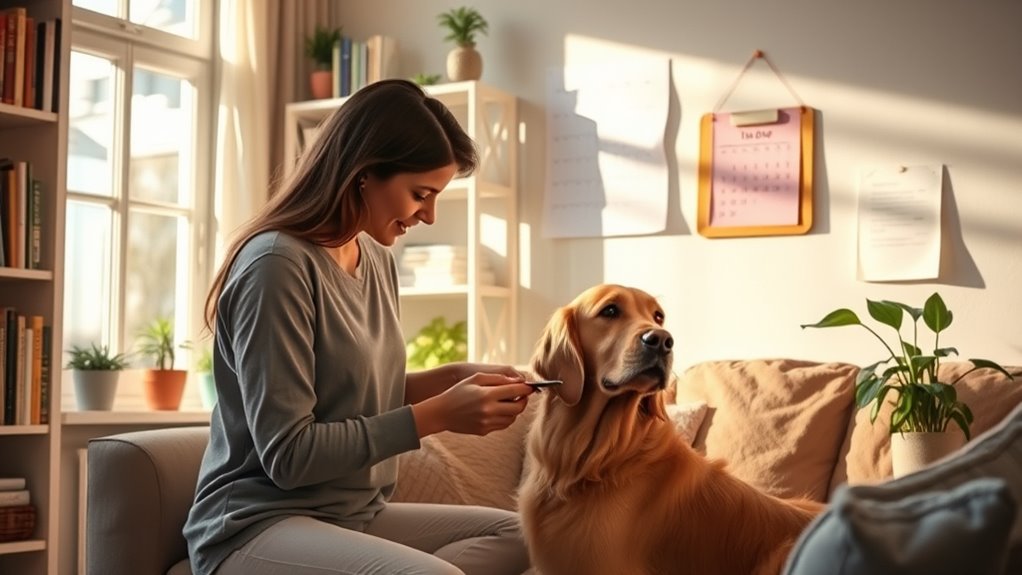Owning a pet offers more than companionship; it actively reduces your stress and boosts your mood through physical contact and routines. Pets foster social connections and help you feel less lonely, providing comfort without judgment. Caring for them also builds your confidence, responsibility, and emotional resilience. Plus, establishing daily routines with your pet creates a sense of stability and purpose. If you want to discover the deeper ways pets enhance your mental and emotional health, keep exploring.
Key Takeaways
- Petting animals releases oxytocin, reducing stress and boosting mood through emotional bonding.
- Pets alleviate loneliness by providing consistent companionship, fostering emotional stability and social connection.
- Caring for pets develops routine, responsibility, and self-esteem, enhancing mental resilience and a sense of purpose.
- Interaction with pets triggers the release of serotonin and dopamine, improving emotional well-being.
- Pets act as social catalysts, encouraging human interaction and strengthening community bonds.
Stress Reduction and Calming Effects

Having a pet can considerably lower your stress levels and create a calming environment. When you’re feeling overwhelmed, spending time with your pet helps distract your mind from worries and brings a sense of comfort. Petting your dog or cat releases oxytocin, the hormone linked to bonding and relaxation, which can reduce cortisol, the stress hormone. Their presence encourages you to slow down and focus on the moment, promoting mindfulness. Simple activities like walking your dog or cuddling with your cat can instantly soothe anxiety. Pets also provide a routine that brings structure to your day, which can be grounding during stressful times. Additionally, engaging in mindset practices with your pet can enhance relaxation and emotional well-being. Overall, their companionship offers a natural, accessible way to calm your mind and ease emotional tension.
Enhanced Social Interaction and Connection

Having a pet can open up more opportunities to meet new people and start conversations. It also helps reduce feelings of loneliness by giving you a shared focus with others. As a result, pets often make it easier to connect with your community and build lasting relationships. Additionally, engaging with other pet owners through social interaction can further enhance social interactions. Incorporating thoughtful space optimization in pet-friendly areas can encourage more communal activities and interactions among neighbors. Emphasizing mental wellbeing in shared spaces can foster a more supportive environment for pet owners and community members alike. Recognizing conflict resolution skills can help create a harmonious environment where pet owners feel comfortable and connected.
Increased Social Opportunities
Pets often serve as social catalysts, making it easier for you to connect with others. When you walk your dog, you naturally strike up conversations with fellow pet owners, sharing tips or stories. At the park or in pet-friendly cafes, your pet becomes a conversation starter, helping you bond with new people. These interactions can lead to friendships and a sense of community. Even online, pet communities provide platforms to share experiences and advice. Having a pet encourages regular social engagement, breaking down barriers that might prevent you from reaching out. This increased social opportunity not only expands your network but also reinforces your sense of belonging, supporting your mental and emotional well-being. Additionally, the father-daughter bond cultivated through caring for a pet can strengthen your emotional resilience and sense of companionship. Building these connections can enhance your social skills, making social interactions more comfortable and meaningful. Furthermore, engaging with other pet owners can introduce you to support networks, which offer emotional assistance and advice during challenging times.
Reduced Feelings of Loneliness
Because pets provide consistent companionship, they help reduce feelings of loneliness by offering a source of comfort and connection. When you come home, your pet is there, enthusiastic to greet you, reminding you that you’re not alone. Their presence creates a sense of routine and stability, which can be especially comforting during tough times. Pets also encourage you to engage more with your environment, whether through walks, play, or simply sitting together. This ongoing interaction fosters emotional bonds that fill gaps of solitude. Over time, caring for a pet helps you feel more connected and less isolated, knowing someone depends on you and values your company. Their unconditional love acts as a powerful antidote to loneliness, making you feel seen and appreciated. Additionally, research shows that pet ownership may even promote mental health benefits by reducing stress and anxiety. Engaging with pets can also stimulate the release of hormones that improve mood, further enhancing emotional well-being. Moreover, caring for a pet can boost your self-esteem as you develop responsibility and feel accomplished in providing for another being. Furthermore, the companionship of pets has been linked to lower blood pressure and overall better heart health, contributing to their positive impact on emotional wellness.
Facilitated Community Engagement
Engaging with pets often serves as a catalyst for building connections within your community. When you walk your dog or visit a local park, you naturally strike up conversations with other pet owners. These interactions can lead to friendships and support networks, breaking down social barriers. Pet-related activities, like training classes or pet meetups, create opportunities for you to meet people with shared interests. Your pet acts as a social bridge, making it easier to connect with neighbors or new acquaintances. Over time, these interactions foster a sense of belonging and community involvement. By participating in pet-centered events, you not only strengthen your bond with your pet but also enhance your social life, contributing to your overall mental and emotional well-being. Additionally, cookie management practices can help ensure a safer and more personalized online experience while engaging in these community activities. Utilizing social engagement strategies can further deepen your connections and support networks within your neighborhood, especially through understanding candy with the most sugar, which highlights the importance of moderation and health awareness in social settings.
Improvements in Mood and Emotional Stability

Having a pet can considerably boost your mood and help stabilize your emotions, especially during stressful times. When you interact with your pet, your brain releases feel-good chemicals like serotonin and dopamine, which lift your spirits. Their presence can reduce feelings of loneliness and anxiety, creating a sense of companionship and safety. Pets also help you stay grounded, encouraging mindfulness as you focus on caring for them. Regular playtime and cuddling can improve your overall emotional resilience, making it easier to handle challenges. Over time, this bond fosters greater emotional stability, helping you manage mood swings and emotional fluctuations more effectively. Essentially, your pet becomes a source of comfort that actively supports positive emotional health.
Increased Sense of Responsibility and Purpose

Taking care of a pet naturally instills a stronger sense of responsibility and purpose in your daily life. You become more attentive to their needs, from feeding and grooming to regular exercise and health check-ups. This routine helps you develop discipline and time management skills, as you prioritize your pet’s well-being. As you care for your pet, you often find a renewed sense of purpose, knowing your actions directly impact their happiness and health. This sense of accountability can spill over into other areas of your life, boosting your confidence and motivation. Over time, your daily responsibilities become more meaningful, fostering a deeper connection and a sense of fulfillment that enhances your overall mental well-being.
Alleviation of Loneliness and Social Isolation

Because pets provide constant companionship, they markedly reduce feelings of loneliness and social isolation. When you come home, your pet is there, enthusiastic to greet you, offering comfort without judgment. They fill quiet spaces and give you a reason to get up each day. Walking your dog or visiting pet-friendly places often leads to conversations with other pet owners, helping you build social connections. Even if you’re shy, your pet can serve as a social bridge, making interactions easier. Their presence reassures you that you’re not alone, providing emotional support during tough times. This companionship creates a sense of belonging, helping you feel more connected to the world around you. Pets truly become a source of comfort and social engagement.
Development of Routine and Structure

Having a pet encourages you to set daily routines that bring stability to your life. You’ll find yourself sticking to consistent walking schedules, feeding times, and exercise routines. These habits help create a sense of order and make your days more predictable.
Daily Walking Schedule
Establishing a daily walking schedule for your pet creates a reliable routine that benefits both of you. Consistent walks help your pet feel secure and promote mental clarity. To make the most of this routine, consider these points:
- Set specific times each day to walk, creating predictability.
- Vary your routes to stimulate your pet’s senses and prevent boredom.
- Keep walks moderate in length to match your pet’s energy level.
- Use walks as an opportunity for training and reinforcing good behavior.
Sticking to a schedule reduces stress for your pet and enhances your bond. It also encourages you to stay active, which benefits your mental health. Over time, this routine fosters stability and emotional well-being for both of you.
Consistent Feeding Times
Maintaining consistent feeding times helps your pet develop a predictable daily routine, which reduces anxiety and promotes a sense of security. When your pet knows exactly when to expect food, they feel more in control of their environment. This stability can lessen stress and prevent overeating or begging behaviors that often stem from uncertainty. Regular feeding schedules also support your pet’s digestion and overall health, making their daily life more structured. As you stick to consistent times, you create a calming rhythm that your pet can rely on. This routine fosters trust and strengthens your bond, helping your pet feel safe in their environment. Over time, this sense of routine positively impacts their emotional well-being, making both your lives more harmonious.
Regular Exercise Routine
A consistent exercise routine builds on the stability created by regular feeding times, giving your pet a predictable daily structure. When you set specific times for walks or play, your pet learns what to expect, reducing anxiety and promoting a sense of security. This routine also helps manage weight, improve behavior, and strengthen your bond. To make the most of this, consider:
- Scheduling daily walks at the same times each day.
- Incorporating variety to keep your pet engaged.
- Using exercise as a reward during training.
- Monitoring your pet’s energy levels to avoid overexertion.
Boosting Self-Esteem and Confidence

Having a pet can remarkably boost your self-esteem and confidence, especially as you develop a stronger sense of responsibility and purpose. Caring for your pet requires daily effort, which reinforces your sense of accomplishment. Watching your pet respond to your guidance builds trust and pride in your abilities. As you meet their needs, you start to see your value and competence grow. Over time, these small successes translate into increased confidence in other areas of your life. Interacting with your pet also encourages social connection, whether through walks or playdates, helping you feel more comfortable and outgoing. This sense of being needed and appreciated nurtures a positive self-image, empowering you to face challenges with greater resilience and self-assurance.
Frequently Asked Questions
How Do Pets Help in Managing Anxiety and Depression?
Pets can be a great help when you’re managing anxiety and depression. They provide constant companionship, which makes you feel less alone. Taking care of them gives you a sense of purpose and routine, helping to distract your mind from negative thoughts. Their playful and affectionate nature can lift your mood, and simply petting them can lower stress hormones. Overall, pets offer both emotional support and a comforting presence during tough times.
Can Pet Ownership Improve Cognitive Function in Older Adults?
Imagine a gentle companion guiding you through each day’s maze; that’s what pet ownership can do for older adults. Your furry friend encourages routine, social interaction, and mental engagement, which collectively boost your cognitive sharpness. As you nurture and care for your pet, you stimulate your mind and maintain mental agility. This warm bond helps keep your mind active, brightening your days and supporting cognitive health over time.
What Are the Physical Health Benefits Associated With Pet Companionship?
Pet companionship can boost your physical health in many ways. When you walk your dog, you get regular exercise, which helps maintain a healthy weight and improves cardiovascular health. Pets also encourage better routines, like consistent activity and sleep patterns. Additionally, caring for a pet can lower blood pressure and reduce stress levels. Overall, having a pet motivates you to stay active and takes care of your physical well-being.
How Do Pets Influence Children’s Emotional Development?
When you have pets, you help children develop emotional skills like empathy, patience, and responsibility. Pets teach kids to read emotional cues and respond compassionately. They provide comfort during tough times, helping kids manage stress and build resilience. As you care for your pet, your child learns trust and attachment. This bond encourages healthy emotional growth, making children more confident and socially aware over time.
Are There Differences in Mental Health Benefits Between Different Types of Pets?
You might wonder if different pets offer unique mental health benefits. Dogs often boost your mood through activity and companionship, while cats provide calming comfort and reduce stress. Small pets like rabbits can teach responsibility and bring joy. Each pet type can support your emotional well-being in distinct ways, so choosing one that fits your lifestyle can maximize these mental health benefits.
Conclusion
Your pet is more than just a companion—it’s a mirror reflecting your inner strength and resilience. As you nurture and care for them, you’re planting seeds of confidence and hope within yourself. Their presence becomes a guiding star, illuminating your path through life’s storms. Embrace this bond, for in caring for your pet, you’re also cultivating a garden of emotional healing and joy—an everlasting symbol of love and renewal.









